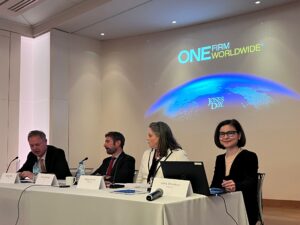Over the past century, the waves of “resource nationalism” have affected foreign investments through government measures, ranging from policy changes, tax regimes and repatriation of profits to expropriation without compensation. Day 2 of the 2023 Paris Arbitration Week (PAW) saw Jones Day hosting a conference on “Resource Nationalism in Investor-State Arbitration”. The panel was composed of Melissa Stear Gorsline (Jones Day), Andrew Webb (BRG), and Prof. Arnaud de Nanteuil (University Paris-Est Créteil; Ernst & Young) and was moderated by Ileana Smeureanu (Jones Day). Prompted by the economic crisis in the wake of the pandemic, the gas and electricity shortages and the ascending inflation, resource nationalistic policies start showing teeth again in different regions worldwide. How can States legitimately justify such measures and protect themselves against treaty claims? How can investors preserve their investments and meet their legitimate expectations? These and other topics were put forward before the panel and addressed by the speakers as summarized below.
Definition and Emergence of Resource Nationalism in Investor-State Arbitration
Melissa Gorsline first noted that numerous definitions of “resource nationalism” have been proposed over the years. While some consider resource nationalism to be per se a wrongful act by a state, other definitions are more neutral in recognizing that resource nationalism can include legitimate efforts by States to increase the benefit from their natural resources for the good of their local community, environment and economy. Favoring a more neutral approach, Ms. Gorsline explained that there are legitimate reasons for a state to bring its natural resources under domestic control. As long as it does so in accordance with the rule of law and due process, resource nationalism need not be a wrongful act. On this basis, she proposed defining the concept as
government policies that appropriate a larger share of resource revenues and increase state control of resource extraction to protect local and indigenous communities and resources from purported misuse by foreign investors.
Addressing the historical background of resource nationalism, Andrew Webb emphasized the difference between the first wave of resource nationalism in the 1950s in Mexico and Iran, where the states’ distrust and interference were provoked by the investors’ attempt to avoid renegotiation of various royalties, from the second wave in the early 2000s, that was generated by the extraordinary demand for resources in China. The prices of electricity and other commodities, coupled with the move away from annual negotiations, provoked a shift from non-volatile pricing to spot pricing. This caused a mismatch because many investors had invested on the back of stabilization clauses that proved to be inflexible when managing volatile prices. States believed that the investors had too good of a deal.

This wave was also impacted by other factors, including (i) project cycles, (ii) political cycles, which led perversely to some investors seeing autocratic or non-democratic countries as easier countries to invest in than democratic, (iii) the variation in the types of activities (strict extraction of raw materials to be shipped overseas or value addition), and (iv) states’ perception of environmental protection.
Focusing on the emergence of the phenomenon in investment arbitration, Prof. de Nanteuil relied on three historical examples to argue that investment arbitration owes a lot to resource nationalism.
First, he noted that the 1930 Lena Goldfields case offers a typical example of old-fashioned resource nationalism in a revolutionary way: all the expropriatory acts happened in one night, the army took the premises, and the top management was sentenced to jail. The USSR was required to provide compensation.
Second, the famous 1938 Mexico v USA case, in which the US State Secretary Cordel Hull sent a letter to Mexican Ambassador Castillo Nájera to request “prompt, adequate and effective” compensation, a standard which, although disputed, remains a cornerstone of what investment arbitration is today.
Third, the three Libyan nationalization cases, the BP Exploration, TOPCO, and LIAMCO arbitrations stated important principles such as, for example, principles related to permanent sovereignty over national resources, and specific performance of the contract. These three cases built the basis for what investment law is. Although the current new wave is based on other considerations (e.g., environmental concerns), it has the very same influence on investment arbitration.
Factors Contributing to the Resurgence of Resource Nationalism
Moving on to the factors contributing to the resurgence of the phenomenon, Melissa Gorsline explained that there cannot be a wave of resource nationalism unless there has been a prior wave of privatization and investment. States’ domestic lack of capital and know-how to access the value of their own resources leads them to search for it outside their borders. During privatization negotiations, investors hold the cards, leaving States with a more minimal share. Once the resources have been located and extraction has begun, that balance of powers shifts.
States are then faced with the choice to either complying with previous commitments, or engaging in resource nationalism. The crucial factors in these situations include (i) an increase in commodity prices, (ii) a change of political leadership, and (iii) local community opposition. What distinguishes the current wave of resource nationalism is the environment. There is no question as to the legitimacy of such measures, but they have to be taken in accordance with the rule of law and due process.
Andrew Webb explained that both States and investors can be under pressure. Taking the example of pollution issues, Mr. Webb explained that where the contract is silent on the matter, the question is whose problem it becomes. While investors and States often try to renegotiate when there is an expansion or a further investment, many problems cannot be solved by simply relying on legal solutions. Pre-negotiation, mitigation, and negotiation are generally used in advance or in parallel without recourse to law.
Typical State Measures and Typical Investor Defenses
According to Prof. De Nanteuil, also developed States conduct resource nationalization, as evidenced in recent years. Most of the time, the “official” reason is the environment—because it is easier to sell to the public—which sometimes conveniently hides something else (e.g., saving costs, controlling a sector). One famous example is Vattenfall v. Germany, which was a way for Germany to get back control over the renewable energy sector. Another illustration is France’s withdrawal from the ECT. While the official reason was that France wanted its sovereignty back to move towards energy autonomy, it occurred four weeks after it faced its first ever ECT claim (Encavis v. France).
As explained by Prof. de Nanteuil, there are no successful expropriation claims anymore because there are no flagrant deprivations anymore. Most of the time, States implement subtle measures such as, e.g., modifying the conditions for an exploitation permit or changing the regulatory framework. Such scenarios fall under the FET standard rather than direct or indirect expropriation, and often raising an expropriation claim later complicates, when it fails, quantum issues for FET violations.
One example of this trend is the famous Eco Oro v. Colombia case, in which Colombia had modified the territorial scope of the project for environmental reasons. While the expropriation claim was rejected, the FET claim was endorsed because it was established that the state had committed to the project despite being aware of the fragile environment in which it was located.

On her end, Melissa Gorsline anticipated huge consequences flowing from modern treaty provisions. Carve-outs from treaty protection force investors to establish that, e.g., an environmental measure is too drastic and was, in fact, intended to be an asset grab. However, in practice, it is very hard to establish states’ mindsets. Ms. Gorsline further explained that States know how to justify their measures with a legitimate purpose. Many of these measures are enacted, e.g., with no public purpose or discriminatory effect.
The most prevalent resource nationalism State actions are tax changes – notably because many treaties exclude tax measures from treaty protection – but also environmental regulatory measures, permit/license denials or revocations. Against these measures, a wise investor should have many options. It should make sure to have (i) a good commercial arbitration clause, in particular with state entities as it remains much easier to bring a commercial arbitration rather than an investment arbitration, (ii) an investment agreement including an express stabilization clause, (iii) a well-structured investment allowing for quality treaty protection, and (iv) investment arbitration available, which is the last line of defense.
In turn, Andrew Webb explained that in a resource nationalism context, quantum is not an automatic assumption. As in other cases, the aim is to help a tribunal navigate through the claims. Part of the role of an expert is (i) to inform the panel about what may have happened in scenarios that have not occurred and (ii) to answer what scenario would have been reasonable and appropriate. His very first lesson is “never claim you are an expert in something you are not”.
Predictions for the Future
Turning on to the potential future of resource nationalism, Prof. de Nanteuil anticipated a multiplication of cases on these issues. The new wave may last as long as the previous one, because many events make the state come back (Ukraine war, energy prices etc.). The impression is that cases are now more and more complex and arguments more and more settled. Overall, States have learned from the past. Investment arbitration is not here to question the legitimacy of measures, but to determine whether States have acted properly. Implementing the Paris Agreement will likely trigger new cases and new questions of interaction between these rules.
Melissa Gorsline noted that resource nationalism is always happening somewhere in the world. It is certain that environmental and investment law will have significant interactions. There will be a clash between the current need for fossil energy in Europe and Europe’s desire to implement the Paris Agreement in the next 20 years. Mr. Webb confirmed that there will be significant pressure on States (e.g., water stress) and all sorts of reasons why they would want to reprioritize the way they deal with their resources. This will necessarily conflict with previous commitments.
Melissa Gorsline added that one of the functions of investment tribunals will involve cost allocation to determine who bears the costs for environmental measures. States are trying to shift the costs of those environmental regulations to the investor by canceling the deals made with them, and changing the regulatory framework.
In conclusion, the actual pattern less favorable to investors is likely to swing again, and investment tribunals are very likely to address “you should have known” arguments from States. Overall, this confirms that, in fine, it will be a cost allocation problem. That is why a reasonable future tribunals in the future will have to determine how these costs are allocated.
________________________
To make sure you do not miss out on regular updates from the Kluwer Arbitration Blog, please subscribe here. To submit a proposal for a blog post, please consult our Editorial Guidelines.


